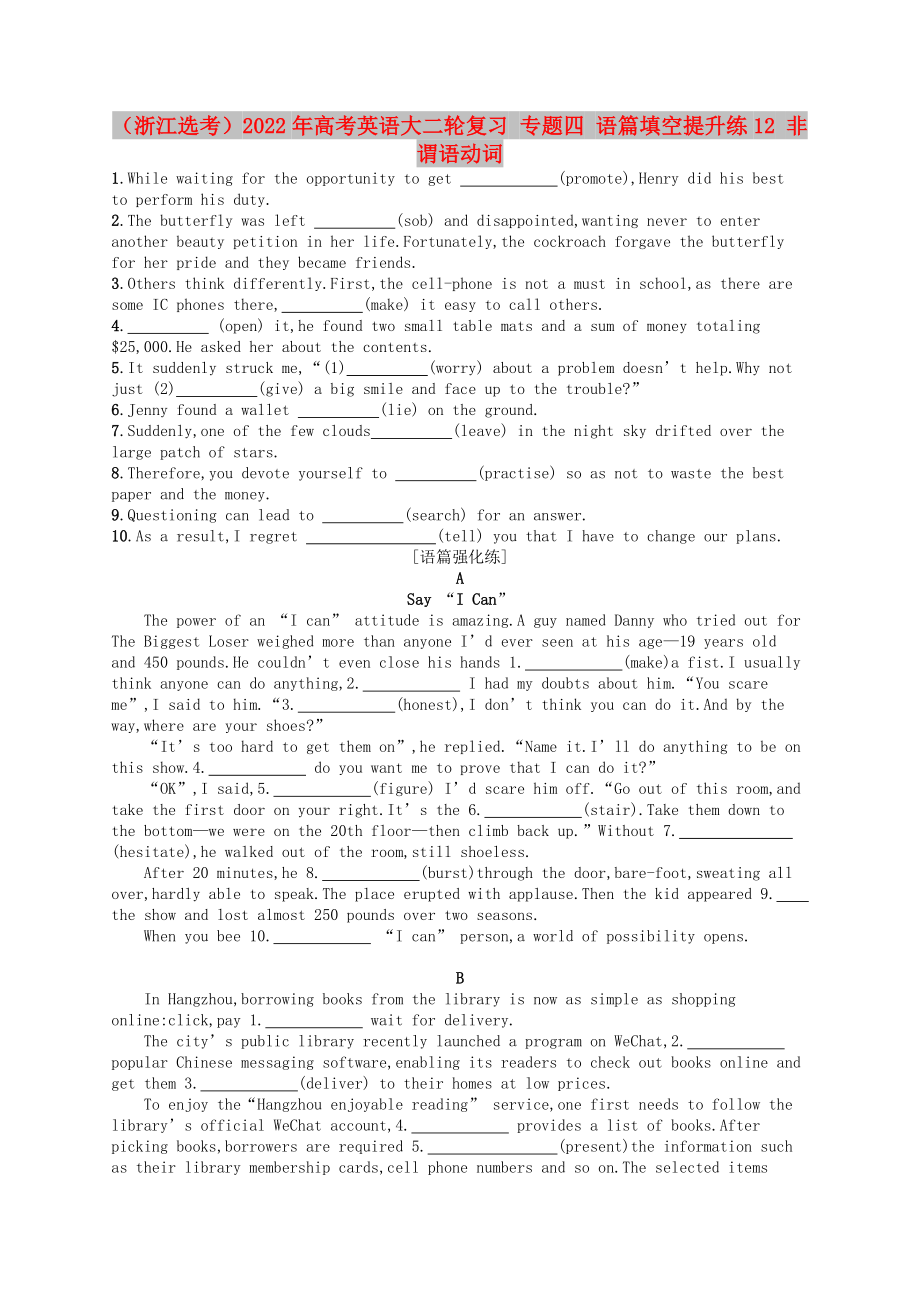《(浙江選考)2022年高考英語(yǔ)大二輪復(fù)習(xí) 專題四 語(yǔ)篇填空提升練12 非謂語(yǔ)動(dòng)詞》由會(huì)員分享����,可在線閱讀,更多相關(guān)《(浙江選考)2022年高考英語(yǔ)大二輪復(fù)習(xí) 專題四 語(yǔ)篇填空提升練12 非謂語(yǔ)動(dòng)詞(4頁(yè)珍藏版)》請(qǐng)?jiān)谘b配圖網(wǎng)上搜索���。
1、(浙江選考)2022年高考英語(yǔ)大二輪復(fù)習(xí) 專題四 語(yǔ)篇填空提升練12 非謂語(yǔ)動(dòng)詞
1.While waiting for the opportunity to get (promote),Henry did his best to perform his duty.?
2.The butterfly was left (sob) and disappointed,wanting never to enter another beauty petition in her life.Fortunately,the cockroach forgave the butterf
2���、ly for her pride and they became friends.?
3.Others think differently.First,the cell-phone is not a must in school,as there are some IC phones there, (make) it easy to call others.?
4. (open) it,he found two small table mats and a sum of money totaling $25,000.He asked her about the conte
3�、nts.?
5.It suddenly struck me,“(1) (worry) about a problem doesn’t help.Why not just (2) (give) a big smile and face up to the trouble?”?
6.Jenny found a wallet (lie) on the ground.?
7.Suddenly,one of the few clouds (leave) in the night sky drifted over the large patch of stars.?
4��、
8.Therefore,you devote yourself to (practise) so as not to waste the best paper and the money.?
9.Questioning can lead to (search) for an answer.?
10.As a result,I regret (tell) you that I have to change our plans.?
[語(yǔ)篇強(qiáng)化練]
A
Say “I Can”
The power of an “I can” attitude is
5����、amazing.A guy named Danny who tried out for The Biggest Loser weighed more than anyone I’d ever seen at his age—19 years old and 450 pounds.He couldn’t even close his hands 1. (make)a fist.I usually think anyone can do anything,2. I had my doubts about him.“You scare me”,I said to him.“3.
6、 (honest),I don’t think you can do it.And by the way,where are your shoes?”?
“It’s too hard to get them on”,he replied.“Name it.I’ll do anything to be on this show.4. do you want me to prove that I can do it?”?
“OK”,I said,5. (figure) I’d scare him off.“Go out of this room,and take
7�����、 the first door on your right.It’s the 6. (stair).Take them down to the bottom—we were on the 20th floor—then climb back up.”Without 7. (hesitate),he walked out of the room,still shoeless.?
After 20 minutes,he 8. (burst)through the door,bare-foot,sweating all over,hardly able to spe
8、ak.The place erupted with applause.Then the kid appeared 9. the show and lost almost 250 pounds over two seasons.?
When you bee 10. “I can” person,a world of possibility opens.?
B
In Hangzhou,borrowing books from the library is now as simple as shopping online:click,pay 1. wai
9�����、t for delivery.?
The city’s public library recently launched a program on WeChat,2. popular Chinese messaging software,enabling its readers to check out books online and get them 3. (deliver) to their homes at low prices.?
To enjoy the“Hangzhou enjoyable reading” service,one first needs
10�、 to follow the library’s official WeChat account,4. provides a list of books.After picking books,borrowers are required 5. (present)the information such as their library membership cards,cell phone numbers and so on.The selected items will be delivered by express within three days after
11、 payments.Each reader can borrow up to 5 books once and 20 books at most 6. total.The books can be borrowed for up to 40 days.Reading now can borrow the library’s most popular books in this way.The online books will be renewed and enriched 7.(gradual) according to readers’ borrowing habits and
12�、 8.(prefer).At the end of December,the library’s old and classic books 9. (put) online too,making the total number of books available and bringing borrowers a lot of 10. (convenient).?
語(yǔ)篇填空提升練(十二) 非謂語(yǔ)動(dòng)詞
[考點(diǎn)鞏固練]
1.promoted “get+過(guò)去分詞”構(gòu)成被動(dòng)語(yǔ)態(tài),如get burnt“被燙傷”,get paid“獲得報(bào)酬”;本句中的get
13、 promoted“獲得提拔”���。
2.sobbing 這里表示“哭著離開”,動(dòng)詞-ing作伴隨狀語(yǔ),表主動(dòng)��。
3.making 表主動(dòng),作結(jié)果狀語(yǔ),表示意料之中的結(jié)果,用動(dòng)詞-ing�。
4.Opening open和它的邏輯主語(yǔ)he是主謂關(guān)系,用動(dòng)詞-ing��。
5.(1)Worrying 為動(dòng)詞-ing短語(yǔ)作主語(yǔ)�。Worrying about a problem在句中作主語(yǔ),故填Worrying。
(2)give why not后習(xí)慣上只接動(dòng)詞原形,不能接帶to的不定式或動(dòng)詞-ing��。
6.lying 句中已有謂語(yǔ)動(dòng)詞found,故lie為非謂語(yǔ)動(dòng)詞;且與邏輯主語(yǔ)wallet存在主
14�����、動(dòng)關(guān)系,故用動(dòng)詞-ing短語(yǔ)作賓語(yǔ)補(bǔ)足語(yǔ)����。
7.left 根據(jù)句子的結(jié)構(gòu)來(lái)判斷,此處是過(guò)去分詞作定語(yǔ),修飾one of the few clouds���。
8.practising 考查動(dòng)詞。句意:為了不浪費(fèi)最好的紙和錢,因此你應(yīng)該致力于多練習(xí)���??瞻浊笆墙樵~to,動(dòng)詞用-ing形式,故填practising����。
9.searching 在lead to結(jié)構(gòu)中,to為介詞,故用動(dòng)詞-ing形式作賓語(yǔ)。
10.to tell 這里描述的是還沒有發(fā)生的事情,所以用動(dòng)詞不定式,表示遺憾�。
[語(yǔ)篇強(qiáng)化練]
A
【語(yǔ)篇導(dǎo)讀】只要相信自己,就會(huì)有奇跡的發(fā)生�����。本文通過(guò)一個(gè)19歲重達(dá)450磅的小伙子丹尼
15�、在作者的懷疑中減肥成功的經(jīng)歷,向我們講述了生活中“我能行”態(tài)度的重要性。
1.to make 考查動(dòng)詞不定式���。這里指的是丹尼,19歲重達(dá)450磅的肥胖程度:不能攥起手來(lái)握個(gè)拳頭����。攥手的目的是為了握拳頭。在句中作目的狀語(yǔ)用動(dòng)詞不定式��。
2.but/yet 考查連詞�����。表示轉(zhuǎn)折關(guān)系�。句意:……但是我對(duì)他的能力存在質(zhì)疑。
3.Honestly 考查副詞����。honestly“說(shuō)真地,坦誠(chéng)地說(shuō)”。修飾整個(gè)句子,作狀語(yǔ)用副詞形式�����。
4.How 考查副詞�����。how在句中作方式狀語(yǔ),意為“怎么樣”�。該句表達(dá)的意思是,你想讓“我”如何證明給你看。
5.figuring 考查非謂語(yǔ)動(dòng)詞����。figure(認(rèn)為)作
16��、謂語(yǔ)動(dòng)詞said的伴隨狀語(yǔ),和其邏輯主語(yǔ),也就是句子主語(yǔ)I,構(gòu)成邏輯上的主謂關(guān)系,故用動(dòng)詞-ing作狀語(yǔ)��。
6.stairs 考查名詞的復(fù)數(shù)形式�。stair為可數(shù)名詞,根據(jù)語(yǔ)境,從二十樓到一樓要走很多樓梯,故用復(fù)數(shù)形式�����。
7.hesitation 考查名詞���。without hesitation是固定搭配,意為“毫不猶豫”���。
8.burst 考查時(shí)態(tài)。根據(jù)語(yǔ)境可知,這里描述的是過(guò)去的動(dòng)作,所以用一般過(guò)去時(shí)�。句意:20分鐘后,他突然沖進(jìn)來(lái),光著腳,汗流浹背,幾乎說(shuō)不出話來(lái)。
9.on 考查介詞���。on the show為固定搭配,第4空前的句子有復(fù)現(xiàn):“I’ll do anything to
17、 be on this show”�。
10.an 考查冠詞。根據(jù)語(yǔ)境,要成為一個(gè)有著“我能行”態(tài)度的人�。“I can”是定語(yǔ),以元音音素開頭,故用不定冠詞an。
B
【語(yǔ)篇導(dǎo)讀】在杭州,借書就像在網(wǎng)上購(gòu)物一樣簡(jiǎn)單便捷��。
1.and 考查連詞�。此處是并列的謂語(yǔ)動(dòng)詞,故填and。
2.a 考查冠詞�。句意:一個(gè)受歡迎的中國(guó)信息軟件。故填a�����。
3.delivered 考查非謂語(yǔ)動(dòng)詞��。固定結(jié)構(gòu);get+賓語(yǔ)+過(guò)去分詞,此處表示被動(dòng)關(guān)系,所以用過(guò)去分詞作賓語(yǔ)補(bǔ)足語(yǔ),故填delivered��。
4.which 考查定語(yǔ)從句��。此處account是先行詞,指物,后面是一個(gè)非限制性定語(yǔ)從句,故填whi
18����、ch。
5.to present 考查非謂語(yǔ)動(dòng)詞���。固定結(jié)構(gòu):require sb.to do sth.“要求某人做某事”,故填to present����。
6.in 考查介詞。in total為固定詞組,意為“總共”,故填in���。
7.gradually 考查副詞�����。修飾動(dòng)詞作狀語(yǔ),用副詞形式,故填gradually��。
8.preferences 考查名詞����。根據(jù)habits可知此處表示“習(xí)慣和偏好”,用名詞的復(fù)數(shù)形式,故填preferences�。
9.will be put 考查時(shí)態(tài)和語(yǔ)態(tài)。根據(jù)句意可知用一般將來(lái)時(shí)的被動(dòng)語(yǔ)態(tài),故填will be put���。
10.convenience 考查名詞�����。句意:帶給借書者許多方便�����。可知此處用名詞形式,故填convenience。
 (浙江選考)2022年高考英語(yǔ)大二輪復(fù)習(xí) 專題四 語(yǔ)篇填空提升練12 非謂語(yǔ)動(dòng)詞
(浙江選考)2022年高考英語(yǔ)大二輪復(fù)習(xí) 專題四 語(yǔ)篇填空提升練12 非謂語(yǔ)動(dòng)詞

